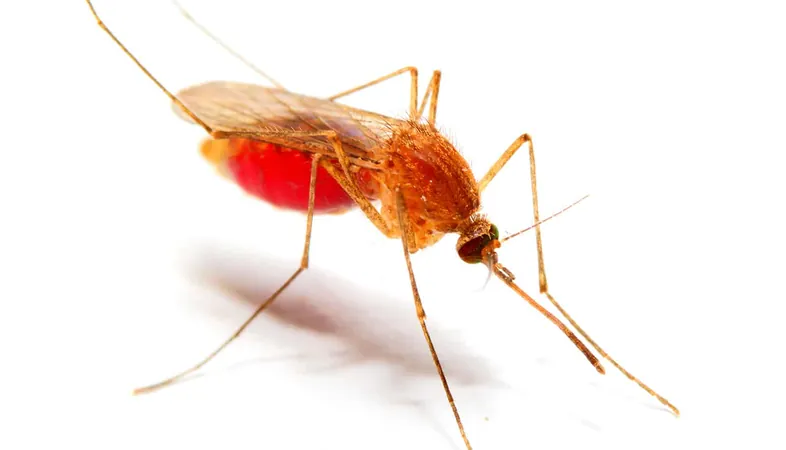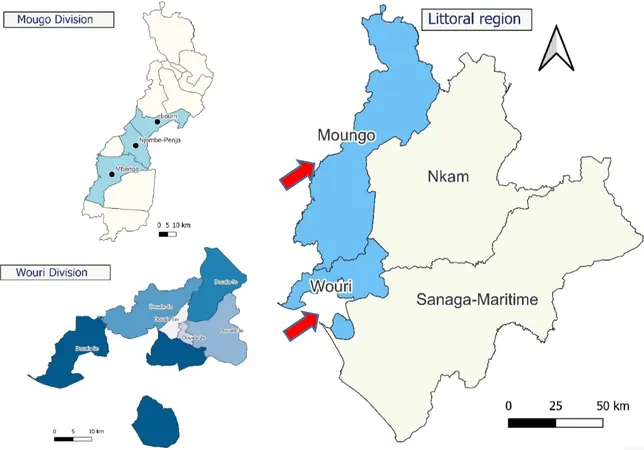
Breakthrough 'Mosquito Shield' Technology Dramatically Reduces Malaria Infections by One-Third
2025-01-03
Author: Ming
A revolutionary spatial repellent known as Mosquito Shield™ has shown remarkable effectiveness in reducing malaria infections, according to a recent study. The combination of this innovative product with traditional insecticide-treated nets led to a staggering reduction of one-third in both first-time and overall malaria infections—33.4% and 32.1%, respectively—compared to a placebo.
"This is a groundbreaking result," emphasizes Bernard Nahlen, a professor of biological sciences at the University of Notre Dame and director of the Eck Institute for Global Health. He explains that while no single solution can eradicate malaria, such a significant reduction in transmission in tandem with existing prevention methods could save tens of thousands of lives every year.
The Mosquito Shield™ functions by being mounted on interior walls, releasing a chemical that effectively repels and immobilizes mosquitoes within enclosed spaces. This product was evaluated in Busia County, Kenya, an area plagued by high malaria transmission despite widespread use of insecticide-treated nets. Resistance among local mosquito populations to existing insecticides has compounded the problem, making innovative approaches like Mosquito Shield™ vital.
The trial confirmed that Mosquito Shield™ serves as a complementary tool rather than a replacement for traditional nets, holding promise for further reductions in malaria transmission in regions with high incidence rates. Researchers estimate that for every 100 individuals using Mosquito Shield™, around 60 malaria infections could potentially be prevented annually.
Philippe Duneton, executive director of Unitaid, expressed pride in their support for the Advancing Evidence for the Global Implementation of Spatial Repellents (AEGIS) trial, highlighting how the results from Kenya signify a major leap forward in malaria control strategies.
Additionally, the trial not only marks a significant milestone in the research of spatial repellents but has also prompted the Kenyan Ministry of Health to integrate spatial repellents into the national malaria control strategy. New guidelines are being crafted to facilitate the large-scale implementation of Mosquito Shield™ as part of Kenya's broader malaria prevention efforts.
According to Professor Elijah Songok, acting director general of the Kenya Medical Research Institute (KEMRI), while significant progress has been made combating malaria in Kenya, regions like Busia County still face alarming infection rates comparable to the most affected countries globally. He stated, “People in these areas urgently need innovative tools and tailored solutions. We are proud to witness the positive impact of this project, translating into real benefits for millions at risk of malaria.”
The AEGIS project, co-led by Unitaid and the University of Notre Dame, is extending its trials of Mosquito Shield™ in other countries such as Mali and Sri Lanka, aiming to assess its effectiveness against both malaria and dengue fever. Notably, previous research partnerships demonstrated a significant 34% reduction in dengue risk with spatial repellents in Iquitos, Peru.
With the World Health Organization (WHO) requiring evidence from diverse settings for potential product recommendations, this Kenyan trial has taken a vital step in securing support for Mosquito Shield™, setting the stage for a transformative addition to malaria control tools. The implications of this innovation could reshape how public health approaches vector-borne diseases, providing hope for millions at risk.


 Brasil (PT)
Brasil (PT)
 Canada (EN)
Canada (EN)
 Chile (ES)
Chile (ES)
 Česko (CS)
Česko (CS)
 대한민국 (KO)
대한민국 (KO)
 España (ES)
España (ES)
 France (FR)
France (FR)
 Hong Kong (EN)
Hong Kong (EN)
 Italia (IT)
Italia (IT)
 日本 (JA)
日本 (JA)
 Magyarország (HU)
Magyarország (HU)
 Norge (NO)
Norge (NO)
 Polska (PL)
Polska (PL)
 Schweiz (DE)
Schweiz (DE)
 Singapore (EN)
Singapore (EN)
 Sverige (SV)
Sverige (SV)
 Suomi (FI)
Suomi (FI)
 Türkiye (TR)
Türkiye (TR)
 الإمارات العربية المتحدة (AR)
الإمارات العربية المتحدة (AR)